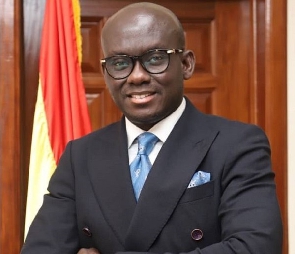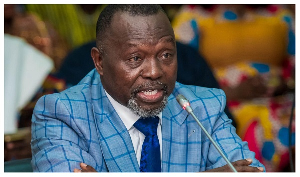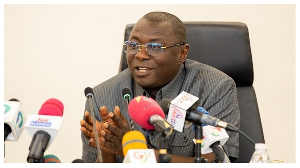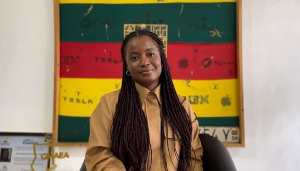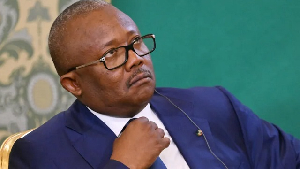This essay is a hymn sheet of praises of the learned Attorney General (A.G), Hon. Godfred Yeboah Dame. The essay shines the light on the work of the AG and applauds the achievements chalked by the relatively young A.G who has held high the image of his office and stands firmly in the defense of our courts.
ADVOCACY
During my days at the Ghana School of Law, I paid visits to the Supreme Court to observe proceedings where I had the privilege of courtroom action of the Attorney General. I continue to enjoy the opportunity of courtroom action of the Attorney General in my days in practice. I say in modesty that the Republic has in Mr. Dame a dependable advocate. This is a man groomed by the best and renders his best.
Mr. Dame commands the respect of the judges he appears before. The respect is not only by virtue of his constitutional privilege[1] as the leader of the Bar but by virtue of the respect for his appreciation of the law, the sophistication of his analysis and the depths from which he draws his legal argumentation.
Mr. Dame holds enormous respect for the Bench. His speech at the Bar to Judges and counsel is almost always draped in respect as required by rules 7 and 63(1) of the Legal Profession (Professional Conduct and Etiquette) Rules, 2020 L. I 2423.
His early presence in court, appropriate dressing as a lawyer and warm approach to fellow counsel when he enters the courtroom is a commendable sight to behold and a mark of respect as early on mentioned. This stands out as a trait worthy of emulation by young lawyers in his chambers and others who have the opportunity of his presence in court.
JUDGMENTS DEBTS
It is indeed heartwarming and gratifying to note that legal representation in matters involving the state has taken a different shape under the leadership of Mr. Dame. The litigating capacity of the chambers of the A.G. has been significantly boosted. The office now records successes in most of its civil cases both local and foreign. Lawyers from the chambers of the AG hold up themselves against other lawyers in most international arbitration cases and international courts without the reliance on foreign counsel. This is a money-saving development in legal representation of the interests of the state. This current situation compares favourably with the heartbreaking situation of legal representation of the state in the immediate past.
The following words of the Supreme Court presided by Wood C.J in the consolidated case of Republic v High Court, Kumasi, Ex-parte Bank of Ghana & Ors (Rev. Rocher De-Graft Sefa & Ors. Interested Parties)[2] capture this lackadaisical and halfhearted approach to representing the interest of the Republic in court;
“the time has indeed come for this court to comment on the manner in which legal representation of state and para-statal interests are handled in our law courts. The quality of legal representation of these institutions leaves much to be desired.”
The Supreme Court in the famous case of Martin Amidu v Attorney General, Waterville and Woyome[3] relied on the above words in condemnation of the conduct of legal representation for the state leading to a judgment debt in favour of the 2nd and 3rd defendants.
Unlike representation as exemplified in the words of the Supreme Court above, current representation from Mr. Dame’s Ministry safeguards the public purse and saves our state billions of dollars in claims[4]. It is in this light that I support Mr. Dame in his gestures to the finance Ministry for the payment of a percentage of money realized or saved in court cases of the state to his Ministry to reduce the financial stress of the Ministry. His Ministry performs a gatekeeping role for the payment of undeserving sums to claims made on or against the state. It is therefore not far-fetched to channel a percentage of such saved funds to strengthen the work of Mr. Dame’s Ministry.
Important to ending the phenomenon of judgment debts and safeguarding the financial interest of the state, the Minister’s office is sponsoring an amendment to the Contracts Act, 1960 (Act 25)[5]. This amendment will prevent the payment of compound interest by the state in transactions entered into. This needed change of the law follows criticisms by the self-same Attorney General against state officers who enter into agreements with high rates of interest especially compound interest in the name of the Republic[6].
CRIMINAL JUSTICE
The following words of the A.G signals the troubling state of Criminal Prosecutions in Ghana;
“The efficiency of a nation’s justice system is tested by the manner in which cases seeking to hold high-profile members of society to account, are conducted. It is unjust and unfair for so-called high-profile criminal cases involving the summary offences of fraud, wilfully causing financial loss to the State and money laundering to drag on for years whilst similar cases filed against the perceived ordinary members of society are concluded within six months to one year.”
Thankfully, the ball is in motion for an extensive amendment to Criminal Prosecutions in Ghana. These changes will be produced by the Criminal Procedure (Amendment) Bill. The overarching aim of this amendment bill will be speedy trials in Criminal Prosecutions. The bill has moved from the Ministry of Justice and sits with Cabinet for later tabling on the floor of Parliament. The image below provides in summarized and infographic form, the intended changes to Criminal trials.
As a layer to refining and modernizing our Criminal Laws and practices, the Attorney General’s Department has its eyes on sentencing and continues the drive for the passage of a Community Sentencing Bill which will decongest our prisons and make punishment for petty crimes non-custodial[7].
RETOOLING DEPARTMENTS
Institutions under the Ministry of Justice under the leadership of the Attorney General, Hon. Godfred Yeboah Dame have had a boost in the delivery of their statutory assigned duties by the acquisition and supply of vehicles to these institutions such as Legal Aid Commission, Economic and Organised Crime Office, Copyright Office amongst others[8]. The Attorney General has signaled continued improvement in the working conditions of offices under his Ministry[9] and also the digitization of information management of the Justice Ministry[10]. This development fortuitously coincides with the aggressive expansion of judicial infrastructure across the length and breadth of the country as over 60 District Courts, 60 Judges’ Bungalows and 3 New High Courts have been added to the existing stock of courthouses and judges bungalows in the Country[11]. In improving the capacity of personnel at the Justice Ministry, Mr. Dame has struck an innovative and praise worthy deal with Georgetown University which provides sponsorship to five lawyers for post-graduate legal studies at Georgetown University[12].
Under this part of this article I repeat in some detail my exposition of Ghanaian law on the duty of a lawyer in the defense of the Court and the Administration of Justice in an earlier published article[13].
A lawyer as a Defender of the Court and the Administration of Justice
A brilliant starting point is the words of Adade JSC in Republic v Mensa-Bonsu and Others; Ex Parte Attorney-General[14] where the learned judge imposes a duty on ordinary members of the public, aside members of the legal profession and the bench in the protection of the judiciary.
“I would wish to caution that we all-the lay public, the legal profession and the judges themselves, have a stake in upholding the integrity, authority and respect of and for the judiciary. If these should collapse, one of the surest foundations of our democracy would have vanished, and we shall all be the poorer for it. [Emphasis supplied]”
A lawyer is thus fixed with the duty, owing to the privileged position he occupies[15], to protect the courts and ensure the administration of justice enjoys the confidence of the public. Indeed, the lawyer is an officer of the court[16] and ought to defend, protect and safeguard the integrity of the court and the justice delivery system. The law compels a lawyer to stand up for the court even where the interest of the client is at variance with the duty of the lawyer to our courts and the dispensation of justice[17].
Standard of conduct
A lawyer[18] is to conduct his or her practice and any other business or deeds in a manner not to prejudice the administration of justice or diminish the confidence of the public in the administration of justice. A lawyer is thus to avoid engaging in conduct that is calculated or likely in a material degree to diminish public confidence in the business of justice delivery[19]. A lawyer is to treat the court with candour[20], fairness, courtesy and respect[21].
Statement about judges and legal officials
A lawyer per Rule 52 of the Legal Profession (Professional Conduct and Etiquette) Rule 2020 L.I 2423 cannot make false statements about the qualification or integrity of a judge or a nominee for the bench. The outright aim is to make the court hallowed and not subject it to mudslinging which other branches of government usually suffer. By so doing, the court is to be kept hallowed not for the mere sake of shielding it in sanctimony, but to help it possess the confidence of the society which built it and which, invariably, often calls upon it to hold it together.
Offer of legal service
The ethical rules of a lawyer relative to confidence of the public in the justice delivery system even reflects in placing the services of a lawyer at the disposal of his clients. A lawyer in offering legal services shall not use means that bring the administration of justice into disrepute.[22]
As the leader of the Bar, Hon. Dame has always stood in defense of the Judiciary regardless of the quarters from which such attacks emanate. His conduct in this light has been consistent with the enjoinment on a Ghanaian lawyer to uphold the integrity and respect of the judiciary. The most recent endeavor by the leader of the bar in shielding the bench from attack is his speech at the Bar conference on 11th September, 2023. The following words embody his fight for upholding the image and respect for the bench especially by members of the bar;
We cannot turn a blind eye to the reality that it has become customary, and for some people, an annual affair, to launch unwarranted attacks on the independence of the Judiciary. If the source of the recent attacks on the independence of the Judiciary is of concern, of even greater worry is the class of people who provide audience for such unwarranted comments to be made. The audience consisted of lawyers. It is worrying because, as I have stated before, lawyers ought to be the loudest and strongest defenders of the independence, integrity and importance of the Judiciary rather than serving as tools for its destruction. By the silence, they have become abettors in the propagation of hate against the Judiciary….It is important that we remain resolute in our defence of the Judiciary at all times.
CONCLUSION
The sensitive role of the Attorney General in the functioning of government and the judiciary of Ghana cannot be diluted. It is therefore gratifying to note the occupant of the office approaches the duties of his office with a high sense of dedication and patriotism. Hon. Godfred Yeboah Dame deserves praise for his leadership at the bar and his inspiring conduct as counsel for the State. Long may this conduct continue and long may the Republic and its judiciary live.
Opinions of Wednesday, 4 October 2023
Columnist: Jonathan Asare Esq.





